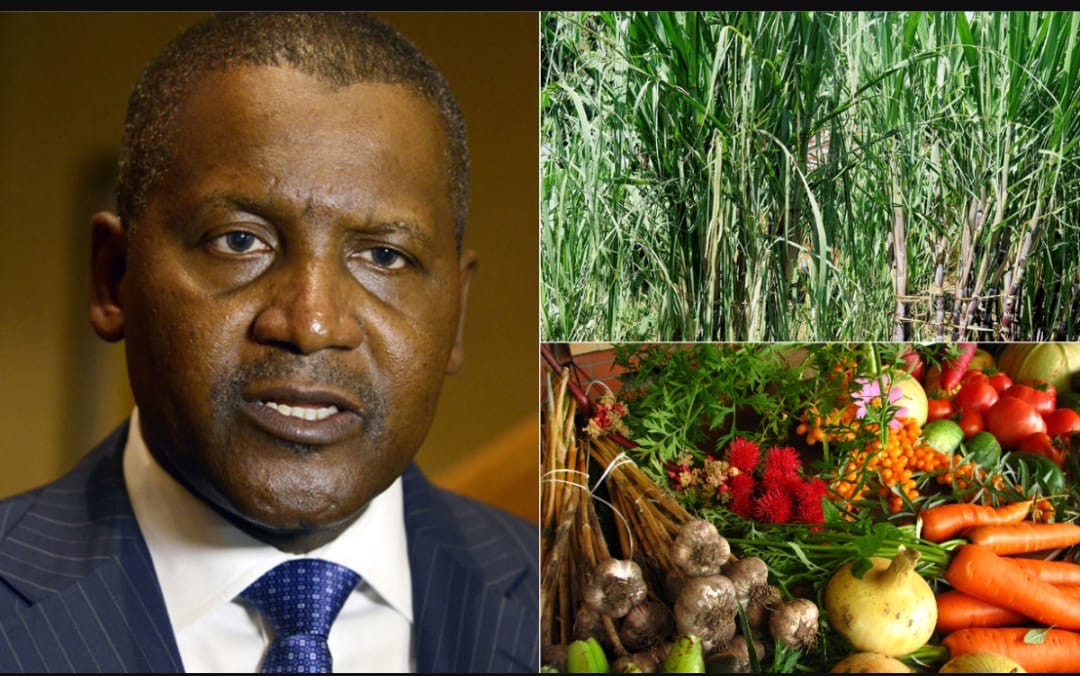Agriculture
FG Predicts Boost in Food Production through Cassava Bio-ethanol Programme

By Tony Obiechina, Abuja
The Federal Government said yesterday that the implementation of the cassava bio-ethanol value chain project would enhance food production, increase youth employment and significantly reduce poverty in the country.
The Permanent Secretary, Federal Ministry of Finance, Budget and National Planning,
Mr Nebeolisa Anako disclosed at a three-day Sensitisation Workshop on the Strategic Implementation of the Bio-ethanol Project held at the Nasarawa State University, Keffi.
Anako who was represented by Dr. Lanre Adekanye, Director, International Cooperation in the Ministry, noted that Nigeria, at this time, needs an approach that will increase food production, youth employment, and increased growth through the provision of industrial feedstock and exportable products to boost the economy.
He explained that to achieve this laudable objective, one of the strategic pathways is the development of cassava bio-ethanol value chain in the country, adding that it has become more imperative, given the recent removal of subsidy on petroleum products, re-evaluation of the Naira through the merging of official and non-official exchange windows.
“One of the aspirations of the Federal Government is to bring about higher Gross Domestic Product (GDP) growth and to significantly reduce unemployment by creating meaningful opportunities for the youth.
“Thus, the Bio-economy Policy aims at promoting sustainable economic growth and development by creating a Bio-based economy that will contribute to the job creation, poverty reduction, and increased access to food and energy.
“This will be achieved through the development of the cassava Bio-economy, as well as other Bio-resources.
“”Development of the Bio-economy value chain is a veritable pathway to assuage the economic impacts on citizens and for sustained development,” the Permanent Secretary stressed.
Recall that bio-economy is the knowledge-based production and use of molecular biology of plant and animal origin and processes to create a wide range of products and services across all sectors of the economy.
Anako further explained that the essence of the three-day sensitisation workshop for the North-Central Region was to develop the modalities for the implementation of the Bio-ethanol project as well as identify the key stakeholders required for the implementation of the entire value chain.
He noted that the implementation of the Bio-economy Policy would employ a Triple-Helix Knowledge Transfer Partnership which would include the Academia, Research and Development Institutes, Farmers, the Private Sector and Government MDAs as well as the Civil Society, Development Partners and Development Finance Institutions.
In his remarks, the Vice Chancellor of Nasarawa State University, Prof. Suleiman Mohammed, said the North Central Region has a rich agricultural heritage, adding that cassava stands as one of the most vital and versatile crops to unlock opportunities, create jobs and foster inclusive growth.
Mohammed pointed out that in the face of global challenges posed by climate change and increasing demand for sustainable energy solutions, cassava bio-ethanol presents a unique opportunity to significantly reduce the carbon footprint and foster greener future.
Also speaking, Prof. Olumuyiwa Jayeoba, President of the Association of Deans of Agriculture in Nigeria (ADAN), said the Association was chosen to implement the pilot project which involves massive seed stock production and farm-level research as well as value chain development, including bio-entrepreneurship in the emerging economic development.
Jayeoba assured of the readiness of ADAN to coordinate and implement the pilot phase of the project, adding that the Association had put “a structure that allows for full implementation of the project, including bio-entrepreneurship and curriculum development.”
Prof. Ken Ife, the Consultant of the Cassava Bio-ethanol Value Chain Project, said only 7 percent of Nigerian graduates get jobs after graduation, adding that there was an urgent need to create new initiatives aimed at addressing youth unemployment in the country.
He underscored the need to engage universities with a view to producing young bio-entrepreneurs and extension service agents.
Agriculture
FG Empowers 9,870 Farmers with Inputs, Modern Rice Technologies in Kano

The Federal Government, through the Kano State Special Agro-Processing Zone (SAPZ) Programme in partnership with IFAD, has empowered 9,870 rice farmers in Kano with climate-resilient inputs and modern rice production technologies.
This was contained in a statement issued by the SAPZ Knowledge Management and Communication Officer, Rabi Mustapha.
The State Project Coordinator, Aminu Iliyasu, disclosed this on Sunday during the Farmers Field Day at Chiromawa Garin Babba Cluster in Garun Malam Local Government Area.
He said the exercise was organised to expose the farmers to Science-based and practical solutions capable of enhancing yields, improving food security, and boosting rural livelihoods.
Iliyasu described the field day as a celebration of knowledge, innovation and the resilience of smallholder farmers.
He explained that the SAPZ initiative in Kano aimed to expand access to improved technologies, strengthen extension services, reduce post-harvest losses and create market opportunities for rural farmers.
“These innovations are not theoretical. They are practical solutions that farmers can adopt immediately to raise productivity and increase income,” he said, while commending the support of local authorities.
Mustapha said the inputs distributed to 9,870 farmers included FARO 44 improved seeds, Urea and NPK fertilizers, and insecticides, targeting beneficiaries in Garun Malam, Gezawa, Bichi and Bagwai LGAs during the 2025 wet season.
She added that experts trained farmers on soil selection, seed dressing, nursery establishment, land preparation, and timely transplanting at proper spacing.
“They also covered fertilizer management, weed control, Integrated Pest Management and water regulation to boost rice yields.
“The training emphasised harvesting at optimal maturity, drying paddy to safe moisture levels, and fumigation using phostoxin to prevent storage losses,” she stated.
A beneficiary, Salamatu Ali, said the intervention had positioned Kano farmers to boost yields, withstand climate pressures and increase household incomes.
Another farmer, Huwaila Ibrahim, said the programme transformed her approach to rice production.
“Before, we planted without checking whether the land was suitable.
“Now, we first assess the soil to ensure it matches the seed variety. This season, we cultivated FARO 44,” she said.
Ibrahim added that her output increased from 20–25 bags per acre to about 40 bags after adopting the improved technologies.
Agriculture
FG Unveils National Agricultural Sample Survey, 2023 Report for Food Security

The Federal Government has launched the National Agricultural Sample Survey (NASS) 2023 report, towards developing data-driven policies to achieve food security and economic diversification.
Minister of Agriculture and Food Security, Sen. Abubakar Kyari, made this known at the launch of “Disseminating the National Agricultural Sample Survey (NASS) 2023 report” on Tuesday in Abuja.
“As a Ministry, we will apply these findings across the core levers of agricultural transformation, ensuring that our programmes remain data-driven, impact-focused and aligned with the aspirations of the Renewed Hope Agenda.
“A nation that measures well governs well. And food security begins with information security.
“This report should be seen as a practical tool for decision-making, one that guides policy choices, informs investment priorities and accelerates the reforms required across Nigeria’s agricultural sector.
“In a country of more than 232 million people, the strength of our food system depends on the quality of the data that guides national decisions,” Kyari said.
The minister explained that without credible evidence, interventions risk being misdirected and investments may fail to reach the areas of highest need.
The News Agency of Nigeria reports that Food and Agriculture of the United Nations (FAO) in collaboration with the Federal Ministry of Agriculture and Food Security, National Bureau of Statistics and the World Bank launched “Disseminating the National Agricultural Sample Survey NASS the 2023 report”.
He stated that the National Agricultural Sample Survey provides reliable, sector-wide data that helps the agriculture sector track production, understand emerging trends, and guide policy decisions.
Kyari added that the launch and dissemination of the National Agricultural Sample Survey 2023 represents an important step in ensuring that our national choices are informed, targeted, and grounded firmly in evidence.
“This report therefore represents more than statistical outputs; it reflects our commitment to transparency, disciplined planning, and the sustainable development of Nigeria’s agricultural sector.
“The findings of the National Agricultural Sample Survey 2023 present a clear and compelling picture of national production.
“The data we are presenting today is central to that mandate because it gives us the precision required to target interventions, close gaps, and drive the reforms needed to secure our nation’s food system.
“These data points also remind us that every figure reflects real activity across the country, from production to processing to marketing.
“With these digital foundations in place, insights from the NASS move from static data to operational intelligence, enabling a more transparent, efficient and connected agricultural system,” the Minister said.
The Director-General FAO representative in Nigeria, Dr. Hussein Gadain, said the NASS 2023 Report is not just a presentation of data but a celebration of collaboration, commitment, and progress towards building a stronger, more resilient agricultural sector in Nigeria.
Similarly, Adeyemi Adeniran Statistician General of National Bureau of Statistics (NBS) said that the NASS Report 2023 provides critical information on crop production, livestock, aquaculture, labour amongst all.
Adeniran who was represented by David Babalola an official of NBS said that data is essential for shaping effective policies and driving sustainable growth.
According to him, the survey also reaffirms the national bioscience commitment to upholding global best practices in data production through improved methodologies, enhanced field operations, rigorous quality data assurance processes and development of modern digital tools, in Nigeria.
Henry Karshima, Assistant Chief Forest Officer in the Ministry of Environment said that the role of agriculture cannot be overemphasised in food security especially with the launch of the survey.
Mr Abdulhameed Umar National Project Coordinator for Agro-Climatic Resilience in Semi-Arid Landscapes expressed satisfaction with the project in the line of restoring land degradation through data collection.
On his part, Asad Alam, the Senior Economist and Project leader 50×2030 Initiative World Bank Nigeria Development Data Group, Economic Division commended the initiative of making data a priority in agricultural activities to ensure food security.
Agriculture
Dangote Restoring Value to Agriculture, Sponsors 2025 Agric Show

By David Torough, Abuja
The Dangote Group has said that it is collaborating with strategic partners to revitalise and strengthen the agricultural sector of the Nigerian economy.
This development comes as the company sponsors the 17th National Agricultural Show, which opens on Tuesday, November 25, 2025, in Keffi, Nasarawa State.
The company’s spokesman, Anthony Chiejina, stated that expanding mechanised agricultural practices will play a critical role in boosting Nigeria’s GDP while creating meaningful employment opportunities for the country’s growing youth population.
“Through this partnership, the company aims to encourage greater participation in commercial agriculture and reinforce its role in advancing Nigeria’s economic growth,” he said.
He said the theme for this year’s Show: Employing Smallholder Farmers: Restoring Value, Ensuring Productivity will Ensure Attainment of Food Security in Nigeria, is apt.
Chiejina said: “Restoring the value of agriculture offers Nigeria more than nostalgic appeal; it provides a pragmatic route to economic renewal. With the right incentives and modern practices, agriculture can once again serve as a reliable engine of growth, anchoring jobs, stabilising markets and giving the economy a sturdier foundation.”
The Agricultural Show, a fixture in Nigeria’s agricultural calendar, offers a platform for showcasing innovation across the value chain.
The statement said the company is currently developing rice mills in Kano, Jigawa, Niger, Kebbi, and Sokoto States, with a combined total milling capacity of 1.5 million tonnes per annum.
It noted that the effort is intended to support the government’s broader push for food security.
The statement quoted the Senior Adviser to the President of the Dangote Group, Mrs. Fatima Wali-Abdurrahman, as saying that, in line with the company’s commitment to restoring value to agro-allied industrialisation in Nigeria, it is investing heavily in its backward-integration projects in the sugar sub-sector in Nasarawa and Adamawa States.
She said as part of its contribution to the agricultural sector, the company has a fertilizer complex in Lagos, located in the Lekki Free Trade Zone, with a production capacity of 3 million metric tonnes per annum of urea.
On the participation of the Dangote Group, Chairman, Board of Trustees (BoT), National Agricultural Foundation of Nigeria, organizers of the annual National Agric Show, Arc Kabiru Adamu, said: “Dangote Group has been our greatest ally from inception and we have enjoyed tremendous and invaluable support from them such that without them we will not be able to continue to hold the show efficiently.”
Adamu, who is also the President, All Farmers Association of Nigeria (AFAN) urged the Dangote Group to focus on agriculture, after its success in the oil and gas sector.
He added that: “This year we envisage a tumultuous turn out of farm machinery manufacturers, processors, researchers and youth and women farmers answering the clarion call to bolster Nigeria’s food system.”





















